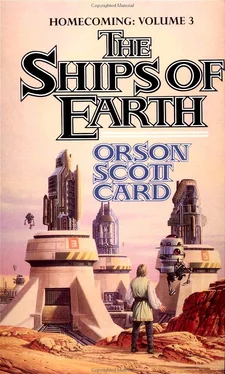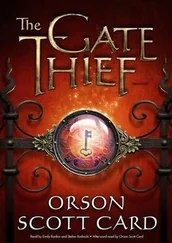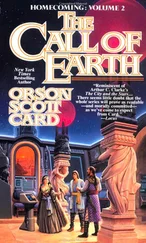Orson Card - THE SHIPS OF EARTH
Здесь есть возможность читать онлайн «Orson Card - THE SHIPS OF EARTH» весь текст электронной книги совершенно бесплатно (целиком полную версию без сокращений). В некоторых случаях можно слушать аудио, скачать через торрент в формате fb2 и присутствует краткое содержание. Жанр: Фантастика и фэнтези, на английском языке. Описание произведения, (предисловие) а так же отзывы посетителей доступны на портале библиотеки ЛибКат.
- Название:THE SHIPS OF EARTH
- Автор:
- Жанр:
- Год:неизвестен
- ISBN:нет данных
- Рейтинг книги:4 / 5. Голосов: 1
-
Избранное:Добавить в избранное
- Отзывы:
-
Ваша оценка:
- 80
- 1
- 2
- 3
- 4
- 5
THE SHIPS OF EARTH: краткое содержание, описание и аннотация
Предлагаем к чтению аннотацию, описание, краткое содержание или предисловие (зависит от того, что написал сам автор книги «THE SHIPS OF EARTH»). Если вы не нашли необходимую информацию о книге — напишите в комментариях, мы постараемся отыскать её.
THE SHIPS OF EARTH — читать онлайн бесплатно полную книгу (весь текст) целиком
Ниже представлен текст книги, разбитый по страницам. Система сохранения места последней прочитанной страницы, позволяет с удобством читать онлайн бесплатно книгу «THE SHIPS OF EARTH», без необходимости каждый раз заново искать на чём Вы остановились. Поставьте закладку, и сможете в любой момент перейти на страницу, на которой закончили чтение.
Интервал:
Закладка:
Growing up in Basilica, most of them had never understood the forces of nature—Basilica was such an unchanging place, with so much pride in its ancienthood. Here, even though the timespans were measured in the millions of years, they could clearly see the enormous power of the planet, and the virtual irrelevancy of the human lives on its surface.
"And yet we're not irrelevant," said Issib. "Because we are the ones who see the changes, and know them, and understand that they are changes, that once things were different. Everything else in the universe, every living and non-living thing, lives in the infinite now, which never changes, which always is exactly as it is. Only we know the passage of time, that one thing causes another and that we are changed by the past and will change the future."
The island widened, and the ground became more rugged. They all recognized it as being the same kind of terrain as the Valley of Fires—the continuation of that valley that Issib had predicted. But it was quieter—they never found a place where gases from inside the earth burned on the surface—and the water was more likely to be pure. It was also drier and drier the farther south they went, though they were rising up into mountain country.
"These mountains have a name," Issib told them, from the Index. "Dalatoi. People lived here before the island split away from the mainland. In fact, the greatest and most ancient of the Cities of Fire was here."
"Skudnooy?" asked Luet, remembering the story of the city of misers who withdrew from the world and supposedly held most of the gold of Harmony in hidden vaults beneath their hidden city.
"No, Raspyatny," said Issib. And they all remembered the stories of the city of stone and moss, where streams flowed through every room in a city the size of a mountain, so high that the upper rooms would freeze, and those who lived there had to burn fires to melt the rivers so that the lower rooms would have water all year.
"Will we see it?" they asked.
"What's left of it," said Issib. "It was abandoned ten million years ago, but it was made out of stone. The ancient road we're following led there."
Only then did they realize that they were indeed following an ancient road. There was no trace of pavement, and the road was sometimes cut by ravines or eroded away. But they kept returning to the path of least resistance, and now and then they could see that hills had been cut into to make a place for the road to go, and the occasional valley had been partly filled in with stone which had not yet worn down to nothing. "If there had been more rain here," said Issib, "there'd be nothing left. But the island has moved south so that this land is now in the latitudes of the Great Southern Desert, and so the air is drier and there's less erosion. Some of the works of humankind leave traces, even after all this time."
"Someone must have used this road in the past ten million years," said Elemak.
"No," said Issib. "No human being has set foot on this island since it fully split off from the mainland."
"How can you know that!" Mebbekew scoffed.
"Because the Oversoul has kept humans from coming here. No one even remembers that this island exists. That's how the Oversoul wanted it. To keep things safe and ready… for us, I guess."
They saw Raspyatny for a whole day before they reached it. At first it simply looked like an oddly textured mountain, but the closer they got, the more they realized that what they were seeing were windows carved into the stone. It was a high mountain, too, so that the city carved into the face of it must be vast.
They camped northeast of the city, where a small stream flowed. They followed the stream and found that it flowed right out of the city itself. Inside, it made cascades and the walls near it were thick with moss; it was much colder than the desert air outside.
They took turns exploring, in large groups, leaving some in charge of the children and animals while the others clambered through the remnants of the city. Away from the stream, the city had not been so badly eroded inside, though nowhere was the interior as well preserved as the outer wall. They realized why, when they found a few traces of an aqueduct system that had, just as the legend said, carried water into every room of the city. What surprised them, though, was the lack of internal corridors. Rooms simply led into each other. "How did they have any privacy?" asked Hushidh. "How did they ever have any time to themselves, if every room was an avenue for people to walk right through?"
No one had an answer.
"More than two hundred thousand people lived here, in the old days," said Issib. "Back when this whole area was farther north, and much better watered—all the land outside was farmed, for kilometers to the north, and yet their enemies could never attack them successfully because they kept ten years' worth of food inside these walls, and they never lacked for water. Their enemies could burn their fields and besiege them, but then they'd starve long before anyone in Raspyatny ever felt the slightest want. Only nature itself could depopulate this place."
"Why wasn't all of this destroyed in the earthquakes of the Valley of Fires?" asked Nafai.
"We haven't seen the eastern slope. The Index says that half the city was wiped out in two great earthquakes when the rift first opened and the sea poured through."
"It would have been glorious to see a flood like that," said Zdorab. "From a safe place, of course."
"The whole eastern side of the city collapsed," said Issib. "Now it's just a mountainside. But this side stayed. Ten million years. You never know. Of course, the streams are eroding it away from the inside, making the outside more and more of a hollow shell. Eventually it'll cave in. Maybe all at once. One part will break, and that'll put too much stress on what is left, and the whole thing will come down like a sandcastle on the beach."
"We have seen one of the cities of the heroes," said Luet.
"And the stories were true," said Obring. "Which leads me to wonder whether the city of Skudnooy might be around here somewhere, too."
"The Index says not," said Issib. "I asked."
"Too bad," said Obring. "All that gold!"
"Oh, right," said Elemak. "And where would you sell it? Or did you think you'd eat it? Or wear it?"
"Oh, I'm not allowed even to dream of tremendous wealth, is that it?" said Obring defiantly. "Only practical dreams allowed?"
Elemak shrugged and let the matter drop.
After leaving the vicinity of Raspyatny—and it took them another whole day to pass around the western side of the city, which really seemed to have covered the whole face of the mountain—they made their way through a high pass, which once again seemed to have been made almost uniform in width in order to accommodate a heavily trafficked road. "Once this was the highway between the Cities of Fire and the Cities of the Stars," said Issib. "Now it leads only to desert."
They came out of the pass and a vast, dry savanna spread out below them; they could see that the island narrowed here, with the Sea of Stars to the east and, far to the west, the blue shimmer of the southern reaches of the Scour Sea. As they descended, they lost sight of the western sea; instead, at the urging of the Oversoul, they hugged the eastern shore, because more rain fell there, and they could fish in the sea.
It was a hard passage—dry, so that three times they had to dig wells, and hot, with the tropical sun beating down on them. But this was exactly the sort of terrain that Elemak and Volemak had both learned to deal with from their youth, and they made good time. Ten days after they came down from the pass through the Dalatoi Mountains, the Oversoul had them strike south when the coastline turned southeast, and as they climbed through gently rolling hills, the grass grew thicker, and here and there more trees dotted the landscape. They passed through low and well-weathered mountains, down through a river valley, up over more hills, and then down through the most beautiful land they had ever seen.
Читать дальшеИнтервал:
Закладка:
Похожие книги на «THE SHIPS OF EARTH»
Представляем Вашему вниманию похожие книги на «THE SHIPS OF EARTH» списком для выбора. Мы отобрали схожую по названию и смыслу литературу в надежде предоставить читателям больше вариантов отыскать новые, интересные, ещё непрочитанные произведения.
Обсуждение, отзывы о книге «THE SHIPS OF EARTH» и просто собственные мнения читателей. Оставьте ваши комментарии, напишите, что Вы думаете о произведении, его смысле или главных героях. Укажите что конкретно понравилось, а что нет, и почему Вы так считаете.









